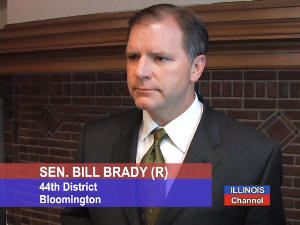Will Bill Brady Borrow Billions to Balance State's Budget?
By Kevin Robinson in News on Oct 6, 2010 3:30PM
 On tour in Illinois yesterday with New Jersey's Republican Governor, Chris Christie, GOP Gubernatorial candidate Bill Brady got caught up in some difficult questions about how he'll handle the state's ballooning budget deficit. Brady called Christie "an inspiration" for cutting New Jersey's budget, but refused to discuss specifics of either the cuts he would propose or the borrowing he would consider, and cut short his news conference when the local media pressed him for details on how to handle the state's $13 billion budget hole.
On tour in Illinois yesterday with New Jersey's Republican Governor, Chris Christie, GOP Gubernatorial candidate Bill Brady got caught up in some difficult questions about how he'll handle the state's ballooning budget deficit. Brady called Christie "an inspiration" for cutting New Jersey's budget, but refused to discuss specifics of either the cuts he would propose or the borrowing he would consider, and cut short his news conference when the local media pressed him for details on how to handle the state's $13 billion budget hole.
Brady has said in the past that he'd avoid borrowing to balance the budget and that he'd cut ten percent "across the board" to bring Illinois's budget back under control. But in comments to the media today, Brady said that "all options have to be considered," refusing to rule out a $50 billion bond to cover the state's deficit.
Brady spokesman Patty Schuh downplayed the record-setting pension bond, telling the Tribune that it is "only and option" and "it is not an option he has embraced," noting that state pensions are so underfunded that everything is under consideration. Quinn spokeswoman Mica Matsoff shot back, saying that the governor will not "stick the taxpayers of this state with $50 billion of debt that would take generations to pay off. This is another reckless idea from Bill Brady, who doesn't have a real plan, but just makes it up as he goes along." For his part, Quinn has made it harder for new employees to access pension benefits, a move that he claims has saved the state hundreds of millions of dollars.
Aside from flirting with issuing a $50 billion bond to cover the state's obligations, Brady's proposal to take 10 percent off Illinois's budget is also facing scrutiny. Local civic watchdog groups, as well as "a top GOP insider" have said that budget items like federal programs and debt service would be exempt from such cuts, to the extent that cuts to the state budget would potentially be as large as 20 percent.